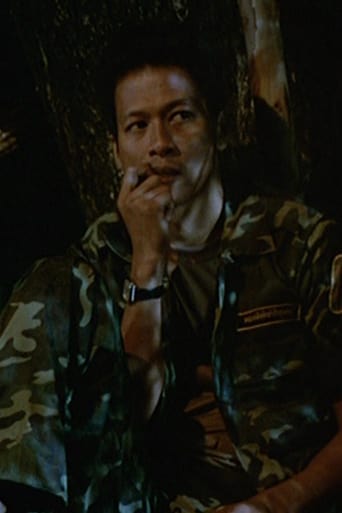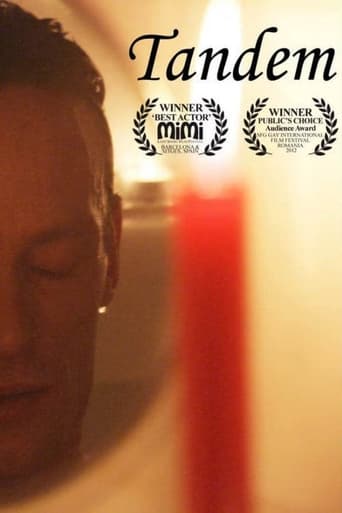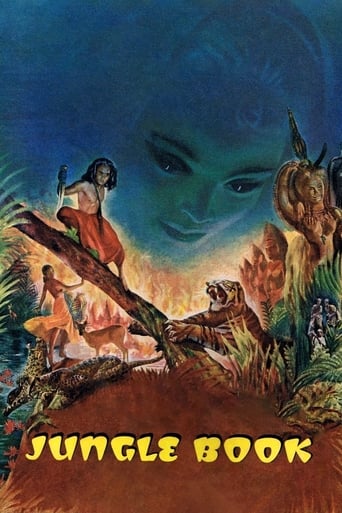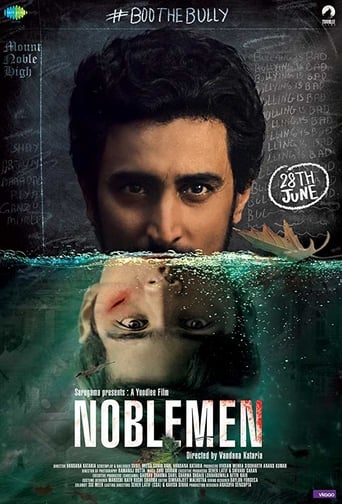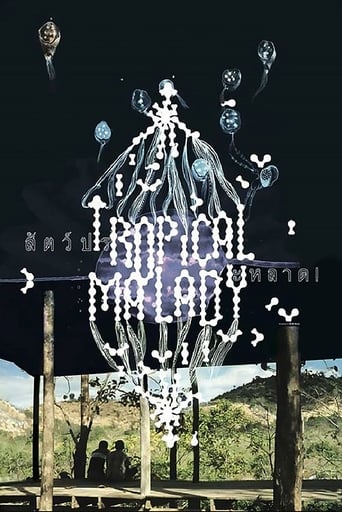

Tropical Malady (2004)
The passionate relationship between two men with unusual consequences. The film is divided in two parts. The first half charts the modest attraction between two men in the sunny, relaxing countryside and the second half charts the confusion and terror of an unknown menace lurking deep within the jungle shadows.
Watch Trailer
Cast


Similar titles
Reviews
Excellent, Without a doubt!!
Excellent, a Must See
While it doesn't offer any answers, it both thrills and makes you think.
Exactly the movie you think it is, but not the movie you want it to be.
A soldier named Keng, meets a young man named Tong in Thailand, the two begin a friendship. Keng makes constant sexual and amorous advances on Tong, who laughs them off, or makes a game out of them. He is never exactly interested, but never fully rebuffs either. The two make trips back and forth from the Jungle where Tong lives and Keng is on patrol with his military unit, to the city. We see the lush silent landscapes and the bustling city life, from dance hall karaoke to the cinema to the solitude of a quiet lake. When Keng finally makes a move in such a way, as to be beyond any doubt of a desire for intimacy (he kisses Tong's hands), Tong responds in turn by doing the same, and then walks into the darkness of the forest. Before Keng, can come to understand, the film takes a drastic turn in tone, style, and mood.We are told by an interjected 3d person narrator the story of a shaman who is a shape-shifter known to take different animal forms, who used to roam the forest playing tricks on people. One day a cunning hunter, did not fall into a trick and shot him, mid transformation from woman into tiger. The spirit of the shaman was then stuck as half tiger half man and eternally doomed to stalk the forest; tricking and devouring all in it's path.Keng, is then on patrol in his section of the forest, exploring rumors from villagers, about some "thing" killing cattle and causing general havoc. Alone on patrol in the woods, he becomes plagued by strange sounds, a sense of dread, and images of a naked boy, a tiger, spectral animals, and a glowing phosphorescent tree (which looks as beautiful as those in Aranofsky's "The Fountain"...I have no idea how they got that effect, on their budget, but it's miraculous...).This second half of the film, of course calls into question our understanding of Keng and Tong's prior relationship (if Tong ever existed at all.). While part one, is reminiscent of a modern quirky love story like "Chungking Express", the second half is like Terrance Mallick shooting a remake of "Predator". All sense of time and space, is swallowed by the jungle, and implicit politics of the first half are turned inside out in the second half; it is literally cat and mouse, with the possibility that the cat may want to be eaten by the mouse, or vice versa.The second half is also marked by the inclusion of tribal art and cave paintings, depicting the story of the shaman and the soldier, with sub-titles accompanying them. To paraphrase a description by director Weerasethakul it's like "a silent film for the first people on earth". And together with the visual effects, confident cinematography, clever use of editing, music, and sound, and disarming performances, it becomes magical. "Tropical Malady" combines the most modern and ancient notions of fear and desire, and makes something "new" out of them.This is Thailand's "Solaris", a story of the changing shapes and forms of want and need, of being deceived and allowing yourself to be deceived by them. It's slow pace, forces reflection on questions like what form or body comprises love, is it purely physical or something more, is it perhaps deception itself, a fools errand we invent to forget the savagery of the jungle around us, is it the need to devour or be devoured? There's a Scottish legend called Tam Lin (one of my favorites), long story short, a woman falls in love with a faerie, and discovers he used to be a man, but made a deal with the faeries to serve them if they spared his life, after an accident. Tam tells the women she can restore his humanity and claim him, if when the faeries pass on Halloween night, she will wrap her arms around him and not let go no matter what happens. She does this, and the faeries transform him into all manner of creature, some hot, some cold, some thorny, others slimy, some which bite and claw, etc, but she holds on throughout all his changes, til eventually she finds herself just cradling a man. And the faeries begrudgingly let her keep him, because she held on to what she loved, despite the way it changed with time.The film opens with these lines, "All of us are by nature wild beasts, our duty as human beings is to become like trainers, who keep their animals in check. And even teach them to perform tasks alien to their bestiality"-Tom Nakajima "Tropical Malady", is a good deal more ambiguous, I suspect more predatory and reflective as well, than Tam Lin, and comes from the opposite side of the world, but like that story manages to peculiarly harmonize emotional sensitivity and mythic scope, into a coherent whole.I wished I would have paid more attention to Weerasethakul "Mysterious Object At Noon" the first time I had the chance, he has a talent for experimenting with narrative and style that is missing in many films endlessly praised these days. The phrase I kept hearing from other reviews or the one I liked the best was "If Brokeback Mountain, was a mountain on the island from "Lost"...it's callous, with a smidgen of truth, but this is a much better movie than that. It is very slow moving though, the first hour will give you no hint of the second half (other than a few visual ones, look at the various statues in the backgrounds, etc), but for the bold and the patient, there is lush hypnotic reward to be had.
I actually feel bad that I did not connect with this film. For all its perceived depth noted in other comments here (and in the pages of Film Comment magazine), this experimental Thai film left me unmoved and even a bit irritated. Perhaps I was not "viewing with my heart," as another commenter suggested was necessary.The one redeeming factor for me was the opportunity for a realistic glimpse of rural Thailand, and some scenes were indeed beautifully photographed.I am no stranger to experimental and non-narrative structures in film, but found myself fast-forwarding through much of this piece, especially the latter "folkloric" half.Inscrutable and languidly paced do not always equal a soulful, moving film experience, and I can't help but wonder if some of the praise for this one comes from those willing to be blown away by anything impenetrably arty.There really is not a lot to this film, not much happens per se, and it is left to the viewer to project one's own sensory or emotional illuminations onto the structure, what little there is. I was unable to make this leap, cold-hearted bastard that I am.
Tropical Malady, the fourth feature by Thai director Apichatpong Weerasethakul, is a film of astonishing lyric power that explores, in myth and reality, the nature of love. The film is divided into a conventional story of friendship between two men, and a mytho-poetic tale that takes the viewer into the middle of a dense Thai jungle. It is a strange and haunting tone poem that is as multi-layered as the forest in which it is filmed and may require repeated viewing to fully unravel. The opening story is about the tentative, playful relationship between Dong (Sakda Kaewbuadee), a shy young farmer who lives with his parents in the Thai countryside and Keng (Banlop Lomnoi), a soldier on furlough from the Thai army. The relationship has homoerotic undertones but they are suggested rather than openly acknowledged.Tong is unsophisticated and appears uneasy in the relationship but never loses control, giving their friendship a charm and sweetness rarely depicted on screen, especially between members of the same sex. They go to a movie, participate in an exercise class, take a sick dog to a clinic, and visit an underground temple. Their relationship develops in simple gestures of affection. Keng gives Tong a Clash tape but later tells him that when he gave him the tape he forgot to give him his heart. He places his hand on Tong's knee but the boy turns it into a mischievous game of squishing his hand with his other leg rather than acknowledging its sensual implications. Keng asks Tong if he can lay in his lap and Tong says "no", then a minute later, he changes that to "no problem". A scene in which Keng mouths Tong's hand after he had urinated and Tong returns the favor with equal passion advances the sexual nature of their relationship but it is not consummated.As Keng leaves for the country to resume his duties, the screen goes blank and we are transported into a land of myth and time in which a folk tale is being narrated in a jungle setting. Called A Spirit's Path, the mood suddenly changes to dark and foreboding. A narrator tells us that a shaman has transformed himself into a tiger and is terrorizing the countryside that Keng is under orders to protect. The soldier's mission is to subdue the tiger (Tong) and release the spirit of a white cow. The lovers are now the hunter and the hunted. Running through the jungle with tattoos all over his body, Tong is a naked man who can shape-shift into an animal at will. As Keng hunts his elusive prey, he begins to lose his grounding in the normal constructs of reality and the framing of the jungle scenes create an atmosphere of brooding surreal intensity.Stripped of the pretense we call civilization, on the border between two worlds, Keng's life unfolds in a desperate vision, suggesting that we are the both the dreamer and that which is being dreamt. He talks to animals, sees ghosts, and receives advice from a baboon who tells him "The tiger trails you like a shadow. He is lonesome. Kill him to free him from his world, or let him devour you to enter his world." As the tiger perches on the branch of a tree staring at him, Keng knows that in order to save his life, he must be willing to sacrifice it. "I give you my spirit, my flesh, and my memories", he tells the tiger, and "Every drop of my blood sings our song A song of happiness. There do you hear it?" Beyond the shadow of illusion, Tropical Malady forces us to see in the dark. What begins with a wan smile ends in a fever of ecstasy.
"Greed is our downfall. I was watching Who Wants to be a Millionaire. The woman won a lot of money but wouldn't stop playing. She lost and only got 30.000 Baht.""The tiger trails you like a shadow. His spirit is starving and lonesome. I see you are his prey and his companion."The experimental creator of "Mysterious Object at Noon" is back with another abstract gem, "Tropical Malady." This time we have a 2-parter connected by common themes and metaphors, a la Wong Kar Wai's Chungking Express, equally casual but much slowly paced here. The first part of the film is set in everyday world. A gay soldier pursues a young country boy. The boy is most likely not gay, but he returns the attraction most of the time, probably because he is attracted to the soldier on another level (e.g. he is fascinated by the soldier's uniform). One day, while the soldier is flipping through the boy's photo album, suddenly the movie blacks out -- enter part 2, a story inspired by legends that parallels part 1, but from an alternative angle that makes it challenging to detect the patterns. Set in the dark tropical forest, the soldier relentlessly hunts a tiger ghost spirit for love, fear, or both (foreshadowed by a shooting computer game played by the boy who later appears as the tiger spirit). The tiger is fascinated by the soldier's sound device. The soldier is warned that he must either kill the tiger or be devoured by it.Part 1 and part 2 are both about desire and pursuit, and essentially follow the same path. In both, the soldier makes great effort to pursue his passion, but it leads him nowhere. He is incompatible with the partner of his desire, so it cannot be satisfied in the case of a straight boy or a tiger. The soldier can be classified as greedy, and it will be his downfall. The 'fairytale-esque' romance in part 1 seems almost Utopian, but it's an illusion that cannot be sustained. In the end he will be consumed by his desires.This is a powerful and challenging film with 2 segments, each providing a distinctive context to view the same patterns. With only 2 or 3 lines of dialogue in the second part of more than 65 minutes, it's a highly sensual and contemplative experience, where every drop of water, wind gently brushing the leaves, and sound of birds singing contributes to your senses. You can literally smell the mud in the fresh rainforest.The photography is undeniably beautiful. The last shot of the film is sheer poetry that will take your breath away.


